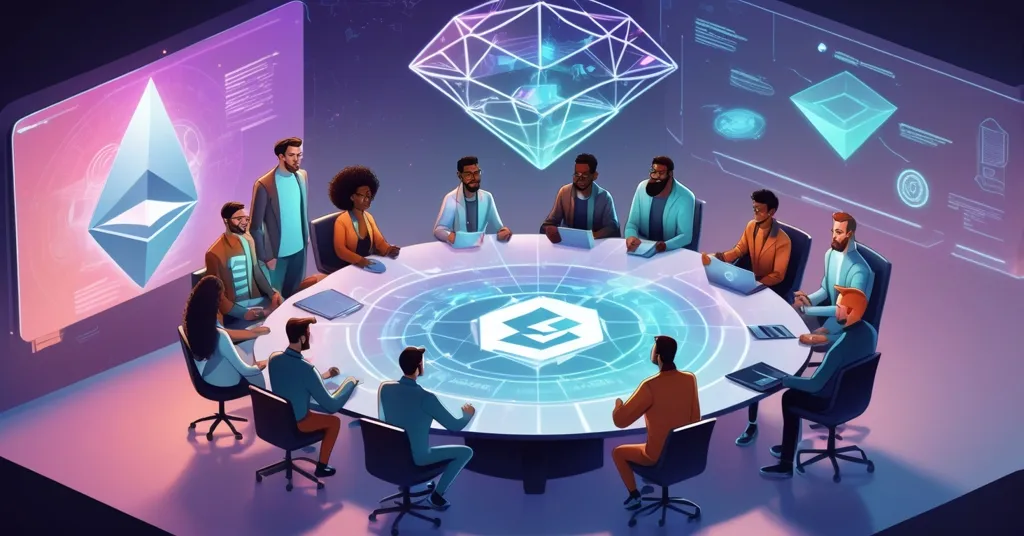First Protocol Research Call Launches to Shape Ethereum’s Future

First Protocol Research Call: A New Era for Ethereum’s Development
The Ethereum community recently achieved a significant milestone with the launch of the first Protocol Research Call, a groundbreaking initiative aimed at shaping the future of the blockchain platform. This call brought together researchers, developers, and enthusiasts to discuss critical aspects of Ethereum’s development, from consensus mechanisms to scaling solutions.
- First Protocol Research Call consolidates Ethereum discussions
- Barnabe and Ansgar Dietrichs lead the initiative
- Focus on consensus mechanisms, transaction execution, and slot finality
The Protocol Research Call series emerged from the need to streamline the scattered conversations that had been occurring across platforms like Discord, Telegram, research papers, and forums. The goal was to create a clear, open space where early ideas could be discussed, refined, and eventually turned into concrete improvements for Ethereum. Key figures Barnabe and Ansgar Dietrichs were instrumental in launching these calls. Barnabe, known for his clear communication and passion for decentralized systems, has been pivotal in promoting structured discussions. Meanwhile, Ansgar’s focus on tackling complex topics like slot finality and validator set dynamics has driven forward meaningful conversations.
During the inaugural call, the community delved into Ethereum’s consensus mechanisms, transaction execution, and the balance between speed and security. A major focus was on slot finality concepts, comparing Single Slot Finality (SSF) and 3-Slot Finality (3SF). SSF, akin to a quick checkout at a store, aims for rapid block confirmation but may increase reorg risks. On the other hand, 3SF, like a more thorough checkout process, adds an extra layer of safety at the cost of speed. These discussions are crucial as Ethereum continues to evolve, with the need to scale the consensus layer, manage the validator set, and enhance Layer 2 solutions to reduce costs and speed up transactions.
The call set the stage for ongoing monthly meetings, providing a platform for the community to suggest topics and share ideas. Future discussions will explore validator rotation, state management, and other technical challenges that Ethereum faces. This initiative reflects the community’s commitment to transparency and collaboration, essential for the evolution of a decentralized platform like Ethereum.
As Ethereum navigates its scaling challenges, the Protocol Research Call series represents a concerted effort to streamline discussions and foster a more cohesive approach to its development. With the network’s base layer currently handling only about 27 transactions per second, significantly lower than competitors like Avalanche and Solana, the urgency of these scaling efforts cannot be overstated. The shift from execution sharding to data sharding (danksharding) and the upcoming EIP-4844 upgrade (proto-danksharding) are key components of Ethereum’s scaling roadmap, alongside the critical role of Layer 2 solutions like optimistic and zero-knowledge rollups.
The economic implications of slot time for on-chain automated market makers (AMMs) were also highlighted, emphasizing how consensus improvements directly impact financial applications on Ethereum. As the community continues to refine these concepts, the future of Ethereum looks promising, with a clear path towards greater scalability and efficiency.
While the Protocol Research Call series is a step forward, it’s important to acknowledge potential challenges. Some critics argue that Ethereum’s scaling solutions are still too slow to compete with newer blockchains. However, the community’s dedication to continuous improvement and innovation remains a strong counterpoint to these concerns.
“The goal was simple: create a clear, open space where early ideas could be discussed, refined, and eventually turned into concrete improvements for Ethereum.”
“Barnabe is known for his clear communication and passion for decentralized systems, he has helped highlight the need for structured, open conversations about Ethereum’s future.”
“Ansgar’s focus on tackling complex topics like slot finality (SSF vs. 3SF) and validator set dynamics has been instrumental in driving forward meaningful discussions.”
Key Questions and Takeaways
What was the purpose of the first Protocol Research Call?
The purpose was to consolidate scattered discussions on Ethereum’s future into a structured, open forum where early ideas could be discussed and refined.
Who were the key figures behind the Protocol Research Call series?
Barnabe and Ansgar Dietrichs were the key figures behind the series, with Barnabe focusing on promoting structured discussions and Ansgar providing technical expertise.
What were the main topics discussed during the first call?
The main topics included Ethereum’s consensus mechanisms, transaction execution, consensus improvements, Layer 2 enhancements, and slot finality (SSF vs. 3SF).
What is the difference between Single Slot Finality (SSF) and 3-Slot Finality (3SF)?
SSF aims for quick block confirmation but may increase reorg risks, while 3SF adds an extra layer of safety at the cost of speed.
How will the Protocol Research Call series continue to shape Ethereum’s development?
The series will continue with monthly meetings, allowing the community to suggest topics and share ideas, focusing on technical challenges like validator rotation and state management.
What are the broader implications of the Protocol Research Call for Ethereum’s future?
As Ethereum continues to push the boundaries of what’s possible with blockchain technology, the Protocol Research Call series stands as a testament to the community’s dedication to progress. With a focus on collaboration and innovation, Ethereum is well on its way to becoming the scalable, secure, and decentralized platform that its advocates envision.
As Ethereum continues to push the boundaries of what’s possible with blockchain technology, the Protocol Research Call series stands as a testament to the community’s dedication to progress. With a focus on collaboration and innovation, Ethereum is well on its way to becoming the scalable, secure, and decentralized platform that its advocates envision.



